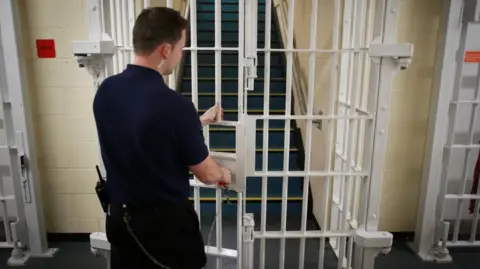
 PA
PA
There are fewer than 100 available spaces left across the male prison estate in England and Wales, the BBC understands.
Sources working across the penal system have said the bank holiday weekend created several challenges, with more arrests due to various festivals taking place, and inmates not released on Monday as they usually would be.
However, they said more people were scheduled to be released in the coming days, which should create more space.
In a speech on Tuesday, Sir Keir Starmer said the government had to “check the precise number of prison places” every day during the recent disorder in parts of the UK, adding that rioters “exploited” the capacity crisis.
Latest figures released by the Ministry of Justice (MoJ) on Friday, 23 August put the current population of the male prison estate in England and Wales at 84,596, with the female figure at 3,638 – the highest total end of week number since weekly data was first published in 2011.
The current operational capacity of the prison system is 89,383 people, covering both the male and female estate.
Further room is set to be created from 10 September when the government plans to begin releasing some inmates early in a bid to manage overcrowding.
In July this year, Labour set out legislation to reduce the amount of time inmates must spend in jail before they are automatically released, from 50% of their sentence to 40%.
The legislation – which does not apply to those convicted of sex offences, terrorism, domestic abuse or some violent offences – is expected to result in the release of 5,500 offenders in September and October.
An MoJ spokesperson said the government had “inherited a justice system in crisis and has been forced into taking difficult but necessary action”.
“Staff across the whole criminal justice system are working incredibly hard and the government will continue to support them before the changes come into effect on 10 September,” a statement added.
In addition to prison overcrowding, criminal courts are facing a backlog of tens of thousands of cases, meaning trials are being delayed, and people are being held in remand for longer.
Sources in the prison estate have said this summer’s riots have added more pressure to a struggling system, with more than 400 people imprisoned in recent weeks including people on remand. At a time when space is in short supply, one prison officer said: “It’s made a messy situation even messier.”
During his speech from Downing Street’s rose garden, the prime minister said the early release scheme was an essential part of the government’s response to this summer’s riots and its ability to prosecute perpetrators of the violence.
Sir Keir added that the decision to release prisoners early was difficult and “goes against the grain of everything I’ve ever done”, referring to his former role as chief prosecutor.
The prime minister said in his speech: “Every day of that disorder, literally every day, we had to check the precise number of prison places and where those places were to make sure we could arrest, charge and prosecute people quickly.
“Not having enough prison places is about as fundamental a failure as you can get and those people throwing rocks, torching cars, making threats, they didn’t just know the system was broken, they were betting on it, gaming it.
“They thought: ‘Ah, they’ll never arrest me and if they do, I won’t be prosecuted, and if I am, I won’t get much of a sentence.'”
Last week, the government activated “Operation Early Dawn” to relieve prison overcrowding.
It means that across the north of England and parts of the Midlands, defendants waiting for a court appearance will be kept in police cells until prison space is available. The system was previously used by the Conservative government.
On Friday, magistrates were also told to delay jailing criminals as the number of people in prison hit its new weekly high.
In the instruction, a senior judge urged court managers to delay the sentencing of some offenders if they are likely to be jailed, but are currently on bail.
In his speech, Sir Keir also said that the last government “haven’t built the prisons, they’ve pretended you can have longer and longer sentences, send more people to prison and at the same time you could veto or choose not to have a prison built near you”.
“They were false choices, and here we are without the prison places that we need.”








